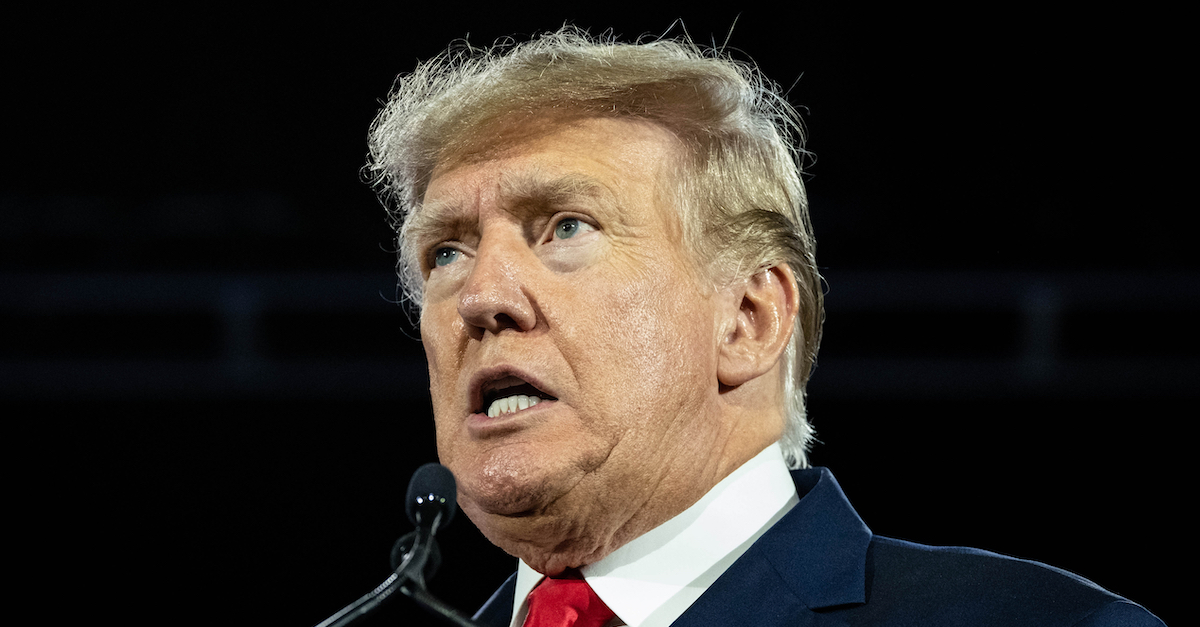
Former U.S. President Donald Trump pictured giving the keynote address at the Faith & Freedom Coalition during their annual “Road To Majority Policy Conference” at the Gaylord Opryland Resort & Convention Center June 17, 2022 in Nashville, Tennessee.
A federal judge in Florida on Tuesday refused to allow two attorneys for former President Donald Trump to represent him in the lawsuit filed over the unprecedented search-and-seizure warrant that was executed at his Mar-a-Lago estate in early August.
The 45th president filed on Monday with the U.S. District Court for the Southern District of Florida and assigned to Trump-appointed U.S. District Judge Aileen M. Cannon. Prior proceedings in the contentious search warrant case – which is now stylized as Trump v. U.S. – were previously being handled by Magistrate Judge Bruce E. Reinhart.
The lawsuit was signed by attorneys Lindsey Halligan of Fort Lauderdale, Florida and two out-of-staters: James M. Trusty of Washington, D.C.; and M. Evan Corcoran of Baltimore, Maryland.
The two out-of-state attorneys, Trusty and Corcoran, filed their pro hac vice motions along with the ex-president’s original petition – including Halligan’s blessing as a member of the Florida Bar and the U.S. District Court for the Southern District of Florida. Latin retained in the service of legalese, attorneys frequently file motions to represent clients in different jurisdictions by filing for pro hac vice or “this occasion only” passes. Without good cause (or, more often, opposition from opposing counsel) to deny any such request, courts typically sign off on such asks without much fanfare or attention.
In a paperless order, Judge Cannon denied both Trusty’s and Corcoran’s requests without prejudice because they apparently filed them incorrectly. A clerk’s notice filed late Monday – in direct response to the pro hac vice motions – offered a preview of this ruling. In that clerk’s notice of filing deficiency, however, a box was checked that suggested the deficiency had to do with a “[t]ranslation not provided for documents written in foreign language.” The federal docket, on the other hand, explains: “Document(s) were filed conventionally that should have been filed electronically.”
The judge’s order notes:
Local counsel is instructed to refile the motions in strict accordance with Local Rule 4(b) of the Rules Governing the Admission, Practice, Peer Review, and Discipline of Attorneys. A sample motion can be found on the Court’s website at https://www.flsd.uscourts.gov/pro-hac-vice-appearance.
The rule cited by the court notes, in relevant part: “A certification that the applicant has studied the Local Rules shall accompany the pro hac vice motion together with such appearance fee as may be required by administrative order.”
The pro hac vice motions filed by Trusty and Corcoran do not contain certifications that either attorney has studied the local rules for the Southern District of Florida. The lack of such attestations appear to be the deficiencies at issue here.
Law&Crime reached out to Halligan, Trusty, and Corcoran for comment on this story but no responses from the ex-presidents trio of lawyers were immediately forthcoming at the time of publication.
Since the denials were issued by the court without prejudice, Trump’s attorneys should easily be able to re-file their motions with the appropriate verbiage – or correct whatever other deficiency has been identified by the clerk – and then represent their client going forward.
[image via Seth Herald/Getty Images]